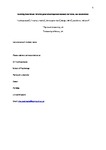Learning from failure: Errorful generation improves memory for items, not associations
| dc.contributor.author | Seabrooke, T | |
| dc.contributor.author | Hollins, Timothy | |
| dc.contributor.author | Kent, C | |
| dc.contributor.author | Wills, Andy | |
| dc.contributor.author | Mitchell, Chris | |
| dc.date.accessioned | 2018-10-04T09:41:54Z | |
| dc.date.issued | 2019-02 | |
| dc.identifier.issn | 0749-596X | |
| dc.identifier.issn | 1096-0821 | |
| dc.identifier.uri | http://hdl.handle.net/10026.1/12450 | |
| dc.description.abstract |
Potts and Shanks (2014) recently reported that making mistakes improved the encoding of novel information compared with simply studying. This benefit of generating errors is counterintuitive, since it resulted in less study time and more opportunity for proactive interference. Five experiments examined the effect of generating errors versus studying on item recognition, cued recall, associative recognition, two-alternative forced choice and multiple-choice performance. Following Potts and Shanks (2014), participants first attempted to learn the English definitions of either very rare English words or Euskara nouns. During encoding, participants either guessed the definition (and almost always made an error) before the correct definition was revealed, or simply studied the words for an equivalent period. Experiments 1–4 used rare English words. In these experiments, generating errors led to better subsequent recognition of both the cues and targets compared with studying (Experiments 1 and 3). Tests of cued recall and associative recognition, by contrast, revealed no significant benefit of generating errors over studying (Experiments 1–3). Generating errors during encoding also improved performance on a two-alternative forced choice test when the correct target was presented with a novel foil, but not when the familiarity of the target and the foil was matched (Experiment 4). In Experiment 5, a different set of materials – Euskara nouns – and a different (intermixed) encoding procedure was adopted. Here, guessing improved target recognition (performance was improved on a multiple-choice test with unfamiliar foils), but impaired cued recall performance. These results suggest that, when learning word pairs that do not have a pre-existing semantic association, generating errors strengthens the cues and targets in isolation, but does not strengthen the cue-target associations. | |
| dc.format.extent | 70-82 | |
| dc.language | en | |
| dc.language.iso | en | |
| dc.publisher | Elsevier | |
| dc.subject | Errors | |
| dc.subject | Learning | |
| dc.subject | Memory | |
| dc.subject | Testing | |
| dc.subject | Education | |
| dc.title | Learning from failure: Errorful generation improves memory for items, not associations | |
| dc.type | journal-article | |
| dc.type | Journal Article | |
| plymouth.author-url | https://www.webofscience.com/api/gateway?GWVersion=2&SrcApp=PARTNER_APP&SrcAuth=LinksAMR&KeyUT=WOS:000453113600005&DestLinkType=FullRecord&DestApp=ALL_WOS&UsrCustomerID=11bb513d99f797142bcfeffcc58ea008 | |
| plymouth.volume | 104 | |
| plymouth.publication-status | Published | |
| plymouth.journal | Journal of Memory and Language | |
| dc.identifier.doi | 10.1016/j.jml.2018.10.001 | |
| plymouth.organisational-group | /Plymouth | |
| plymouth.organisational-group | /Plymouth/Admin Group - REF | |
| plymouth.organisational-group | /Plymouth/Admin Group - REF/REF Admin Group - FoH | |
| plymouth.organisational-group | /Plymouth/Faculty of Health | |
| plymouth.organisational-group | /Plymouth/Faculty of Health/School of Psychology | |
| plymouth.organisational-group | /Plymouth/REF 2021 Researchers by UoA | |
| plymouth.organisational-group | /Plymouth/REF 2021 Researchers by UoA/UoA04 Psychology, Psychiatry and Neuroscience | |
| plymouth.organisational-group | /Plymouth/REF 2021 Researchers by UoA/UoA04 Psychology, Psychiatry and Neuroscience/UoA04 REF peer reviewers | |
| plymouth.organisational-group | /Plymouth/Research Groups | |
| plymouth.organisational-group | /Plymouth/Research Groups/Centre for Brain, Cognition and Behaviour (CBCB) | |
| plymouth.organisational-group | /Plymouth/Research Groups/Centre for Brain, Cognition and Behaviour (CBCB)/Cognition | |
| plymouth.organisational-group | /Plymouth/Research Groups/Institute of Health and Community | |
| plymouth.organisational-group | /Plymouth/Users by role | |
| plymouth.organisational-group | /Plymouth/Users by role/Academics | |
| plymouth.organisational-group | /Plymouth/Users by role/Researchers in ResearchFish submission | |
| dcterms.dateAccepted | 2018-10-04 | |
| dc.rights.embargodate | 2019-10-19 | |
| dc.identifier.eissn | 1096-0821 | |
| dc.rights.embargoperiod | Not known | |
| rioxxterms.version | Accepted Manuscript | |
| rioxxterms.versionofrecord | 10.1016/j.jml.2018.10.001 | |
| rioxxterms.licenseref.uri | http://www.rioxx.net/licenses/all-rights-reserved | |
| rioxxterms.licenseref.startdate | 2019-02 | |
| rioxxterms.type | Journal Article/Review | |
| plymouth.funder | Learning from total failure: why do impossible tests boost learning?::ESRC |


